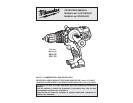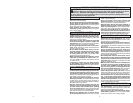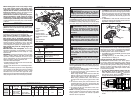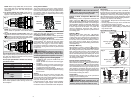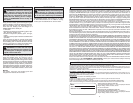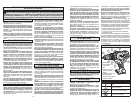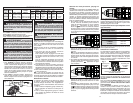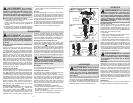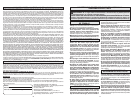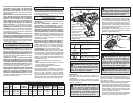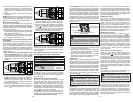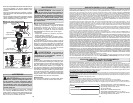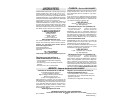
4
5
FUNCTIONAL DESCRIPTION
SYMBOLOGY
SPECIFICATIONS
ASSEMBLY
WARNING Recharge only with the
charger specifi ed for the battery. For specifi c
charging instructions, read the operator’s
manual supplied with your charger and battery.
Inserting/Removing the Battery
To remove the battery, push in the release buttons
and pull the battery pack away from the tool.
To insert the battery, slide the pack into the body
of the tool. Make sure it latches securely into place.
Cat. No.
Volts
DC
No Load
RPM
No Load Blows
per Minute
Capacities
Steel
Flat
Bit
Auger
Bit
Hole
Saw
Screws
(dia.) Masonry
2610-20
2611-20
18
18
Low 0-450
High 0-1800
Low 0-450
High 0-1800
n/a
Low 0-7200
High 0-28,800
1/2"
1/2"
1-1/2"
1-1/2"
1"
1"
2-1/8"
2-1/8"
1/4"
1/4"
n/a
5/8"
1. Trigger
2. Control switch
3. LED
4. Keyless chuck
5. Torque selector collar
6. Application selector
collar
7. Speed selector
8. Side handle
1
2
8
4
6
7
5
3
WARNING Always remove battery
pack before changing or removing acces-
sories. Only use accessories specifically
recommended for this tool. Others may be
hazardous.
OPERATION
WARNING Always remove battery
pack before changing or removing acces-
sories. Only use accessories specifically
recommended for this tool. Others may be
hazardous.
WARNING To reduce the risk of injury,
wear safety goggles or glasses with side
shields.
Installing the Side Handle
1. To install the side handle, loosen the side handle
grip until the hooks are far enough apart to fi t into
the slots on the gear case ring. The side handle
can be positioned on the top, left, or right side
of the tool. Tighten the side handle grip until it is
secure.
2. To remove the side handle, loosen the side
handle grip until the side handle can be removed.
Reposition and tighten securely.
Using Keyless Chucks
This tool is equipped with a spindle lock. The chuck
can be tightened with one hand, creating higher grip
strengths on the bit.
Always remove the battery pack or lock the trigger
before inserting or removing bits.
1. To open the chuck jaws, turn the sleeve in the
counterclockwise direction.
When using drill bits, allow the bit to strike the
bottom of the chuck. Center the bit in the chuck
jaws and lift it about 1/16" off of the bottom.
When using screwdriver bits, insert the bit far
enough for the chuck jaws to grip the hex of the
bit.
2. To close the chuck jaws, turn the sleeve in the
clockwise direction. The bit is secure when the
chuck makes a ratcheting sound and the sleeve
can not be rotated any further.
3. To remove the bit, turn the sleeve in the coun-
terclockwise direction.
NOTE: A ratcheting sound may be heard when the
chuck is opened or closed. This noise is part of the
locking feature, and does not indicate a problem
with the chuck’s operation.
WARNING To reduce the risk of injury,
always use a side handle when using this tool.
Always brace or hold securely. Ensure side
handle is tightened securely before each use.
Fig. 1
Hooks
Slots
Fig. 2
To Hammer
Selecting Speed
The speed selector is on top of the motor housing.
Allow the tool to come to a complete stop before
changing speeds. See “Applications” for recom-
mended speeds under various conditions.
1. For Low speed (up to 450 RPM), push the speed
selector to display “1”.
2. For High speed (up to 1800 RPM), push the
speed selector to display “2”.
Selecting Hammer, Drill or Drive Action
MILWAUKEE Hammer-Drills have three operat-
ing modes: drilling with hammering action, drilling
only, and driving screws. MILWAUKEE Driver Drills
have two operating modes: drilling only and driving
screws. To set the operating mode, rotate the ap-
plication selector collar and torque selector collar
to the desired symbols.
1. To use the hammer-drilling mode (Cat. No.
2611-20 only), rotate the application selector
collar until the hammer symbol
appears in
line with the arrow. Apply pressure to the bit to
engage the hammering mechanism.
NOTE: The number selected on the torque collar
has no effect on operation of the drill in hammer
mode.
• Wear ear protectors when impact drilling.
Exposure to noise can cause hearing loss.
• Use auxiliary handle(s), if supplied with the
tool. Loss of control can cause personal injury.
• Hold power tool by insulated gripping sur-
faces, when performing an operation where the
cutting accessory may contact hidden wiring.
Cutting accessory contacting a “live” wire may
make exposed metal parts of the power tool “live”
and could give the operator an electric shock.
• Keep hands away from all cutting edges and
moving parts.
• Maintain labels and nameplates. These carry
important information. If unreadable or missing,
contact a MILWAUKEE service facility for a free
replacement.
• WARNING: Some dust created by power sanding,
sawing, grinding, drilling, and other construction
activities contains chemicals known to cause
cancer, birth defects or other reproductive harm.
Some examples of these chemicals are:
• lead from lead-based paint
• crystalline silica from bricks and cement and other
masonry products, and
• arsenic and chromium from chemically-treated
lumber.
Your risk from these exposures varies, depending
on how often you do this type of work. To reduce
your exposure to these chemicals: work in a well
ventilated area, and work with approved safety
equipment, such as those dust masks that are spe-
cially designed to fi lter out microscopic particles.
SPECIFIC SAFETY RULES
• When battery pack is not in use, keep it away
from other metal objects like paper clips,
coins, keys, nails, screws, or other small metal
objects that can make a connection from one
terminal to another. Shorting the battery termi-
nals together may cause burns or a fi re.
• Under abusive conditions, liquid may be eject-
ed from the battery; avoid contact. If contact
accidentally occurs, fl ush with water. If liquid
contacts eyes, additionally seek medical help.
Liquid ejected from the battery may cause irritation
or burns.
SERVICE
• Have your power tool serviced by a qualifi ed
repair person using only identical replacement
parts. This will ensure that the safety of the power
tool is maintained.
Volts
Direct Current
No Load Revolutions per
Minute (RPM)
Underwriters Laboratories, Inc.
United States and Canada



